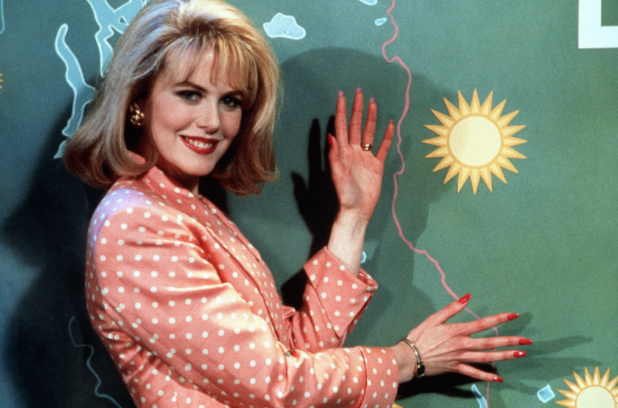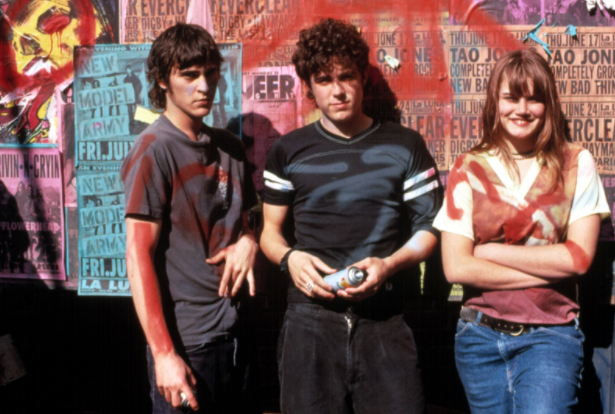To Die For was released nationwide in theaters on this day in 1995. Here's Christopher James...

Is Nicole Kidman funny? Critics of the Oscar winning actress have often called her “cold,” rendering her incapable of cracking a smile, much less a laugh. Given that perception it’s funny that Nicole Kidman was first taken seriously for her comedic chops. Best known in 1995 as Mrs. Tom Cruise and Dr. Chase Meridian in Batman Forever, Kidman was in search of a vehicle that would showcase more of her considerable talents. Along came To Die For, based on the Joyce Maynard book of the same name which borrowed details from the Pamela Smart case that took the media by storm. Originally offered to Meg Ryan, Kidman eventually won the part and received a fair share of accolades, including a Golden Globe win and a BAFTA nomination.
Talking about the virtues of Nicole Kidman on The Film Experience is the very definition of “preaching to the choir.” Yet, preach away I will...

Not only that, I get to celebrate the anniversary of To Die For, the film that finally taught audiences to take her seriously and the performance that won the Kidman World Cup. Is the performance the best of Kidman’s career? No, but it’s close. I would only rank Rabbit Hole and Birth above it. Does the film hold up 25 years later? That it does!
Almost immediately, the film plays with perspective in interesting ways. With reporters rushing to a grave site over the titles and Danny Elfman’s macabre twinkling score, Gus Van Sant sets the tone for the sexy, wacky next 105 minutes. We’re treated to news segments, tabloid headlines and the flashes of paparazzi before we’re introduced to the woman at the center of the hubbub, Suzanne Stone Maretto (Nicole Kidman).
“It’s like if you get too close to the screen all you can see is a bunch of little dots. You don’t see the big picture until you stand back.”
Bright-eyed and pearly-whites showing, Suzanne is already trying to win the audience over. However, she’s just one dot in this tapestry of sex, murder and infamy. Buck Henry’s script makes perfect use of the mockumentary format to give voice to all the major players behind the death of Suzanne’s adoring husband, Larry (Matt Dillon). Suzanne sees herself as the star of the show, but the other supporting narratives paint a very different portrait of her. To Die For holds up because it uses flashbacks, narration and perspective to create a rich, yet monstrous, mosaic of Suzanne, a legendary black widow.
 The major strength of Kidman’s performance could have easily been a major weakness in a lesser star's hands. Kidman dials up the unlikability. Suzanne is a driven and sociopathic monster who will stop at nothing to achieve fame, be it statutory rape or murder. Kidman commits to Suzanne’s all consuming hunger to be on television, without a care in the world for audience sympathies. For a movie to rest on a character so heinous, the actress must leave no room for error. Both Kidman and director Gus Van Sant understand Suzanne’s motives, which gives them ample room to skewer and critique them. This fearless dare to be hated, especially at such a pivotal moment in her career, demonstrates Nicole Kidman’s one of a kind ability to take risks with her authorial voice as an actress.
The major strength of Kidman’s performance could have easily been a major weakness in a lesser star's hands. Kidman dials up the unlikability. Suzanne is a driven and sociopathic monster who will stop at nothing to achieve fame, be it statutory rape or murder. Kidman commits to Suzanne’s all consuming hunger to be on television, without a care in the world for audience sympathies. For a movie to rest on a character so heinous, the actress must leave no room for error. Both Kidman and director Gus Van Sant understand Suzanne’s motives, which gives them ample room to skewer and critique them. This fearless dare to be hated, especially at such a pivotal moment in her career, demonstrates Nicole Kidman’s one of a kind ability to take risks with her authorial voice as an actress.
While the movie belongs to Nicole Kidman, To Die For relies on the conflicting testimony given by the other cast members left alive at the end. With each re-watch, Illeana Douglas’ performance as Janice, Larry’s ice-skating sister, stands out more and more. In a movie full of murderous blonds, burnout teenagers and lovestruck losers, Janice is the voice of reason and our audience surrogate. Douglas enters each scene knowing she’s the most sane person in the room. Her response to an interviewer’s question about first impressions of Suzanne is genius line reading.

“First impressions? Do you really want to know? Four letters, starts with C. '' (beat) “Cold. C-O-L.D. Cold.”
Her brother may be dead, but she’s making a meal out of dunking on Suzanne. This initial reaction isn’t all revisionist history. She pegs Suzanne as an ice princess the minute her brother lays eyes on her at their family restaurant. “Have you ever tried kissing a doll? They don’t kiss back,” she tells him shortly after he’s become smitten. Once married, Suzanne manages to steal the spotlight at every family gathering. She gets some help from her puffball dog, Walter, which Janice calls “a hairball puked up by a demon from hell.” Douglas wordlessly captures in the side of each frame what it’s like to be the one single sibling at a family dinner. She tries to divert the conversation to her booming ice skating career, but there’s no oxygen in the room left for her. All eyes are always on Suzanne, just the way she likes it.

The family drama makes for terrific comedy, but the plot really kicks into gear when Suzanne visits a local high school for her “Teen Speaks” series. She winds up with three low-achieving students who are all there with ulterior motives. Jimmy (Joaquin Phoenix) falls in love with her. Lydia (Alison Folland) wants to be her (and maybe has her own repressed sexual desires of her own). Finally, Russel (Casey Affleck) is just there to not get whacked by Suzanne’s father-in-law. Each is like clay in Suzanne’s hands, easy to be molded. She basks in their lionization, knowing she can use that to her benefit later on. It’s not long until Suzanne embarks on an affair with Jimmy and subsequently asks him to murder her husband.
Through Jimmy and Lydia’s interviews, one sees the lingering effect Suzanne has left on both of them. Between the affair and murder plot, it’s clear Suzanne’s grooming still has left mental reprecussions. Lydia is still trying to fit into a dress that Suzanne got her when we’re introduced to her. The mental scars of her comments and actions still pollute her mind, even after a man has been killed. Meanwhile, Jimmy is behind bars for his actions, but still thinks of Suzanne whenever it rains. Even after she has so grievously wronged them, they can’t help thinking of her as a mentor or paramour.

The central flaw with Suzanne is summed up in an offhand exchange with her station manager, Ed Grant (Wayne Knight). “I sure pity the person who says no to you,” he says one night as he’s leaving work. “Nobody does,” Suzanne tosses back. Kidman wisely underplays this moment. Suzanne exists in her own reality completely divorced from other people. To suggest someone defy her doesn’t logically compute. We see many moments where Suzanne seems obtuse or stupid for not picking up social cues or understanding jokes. She’s been coddled too much by her adoring parents (Kurtwood Smith and Holland Taylor, worryingly doting) that she can’t register other people’s feelings or emotions. It only takes one, rather weak, no from Larry for Suzanne to switch from viewing him as an enabler to an obstacle. To Suzanne, the world is black and white. There are people that are with her and people that are against her.
Lydia gets the last laugh. She gets booked on Phil Donohue, Oprah and some others she can’t remember off hand. “It’s really something when you think that I’m the one that’s gonna be famous,” Lydia half chuckles. “Suzanne would die if she knew.” We suddenly see Lydia’s image split into countless grids, almost like TV monitors. Virality was a little more long lasting in the 90s compared to today. Still, Lydia’s time in the spotlight won’t likely be long. However, it serves as the perfect figurative knife in Suzanne’s TV obsessed heart. Not to be outdone, our credits close on Janice quite literally skating over what we believe to be Suzanne’s final resting place. You have to be a top-tier villain to inspire such vitriol in an ending. Luckily, Nicole Kidman and Suzanne Stone Maretto earn it.
